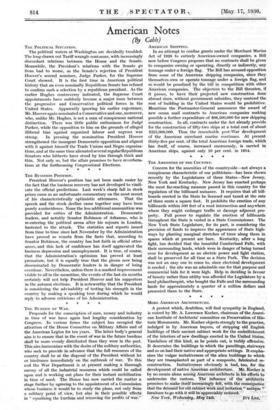American Notes
(By Cable)
THE POLITICAL SITUATION.
The political waters at Washington are decidedly troubled. The long-drawn out Tariff wrangle continues, with increasingly discordant relations between the House and the Senate. Meanwhile, the President's relations with the Senate _go from bad to worse, as the Senate's rejection of President Hoover's second nominee, Judge Parker, for the Supreme Court showed. It is the first time in American political history that an even nominally Republican Senate has refused to confirm such a selection by a republican president. As the earlier Hughes controversy indicated, the Supreme Court appointments have suddenly become a major issue between the progressive and Conservative political forces in the United States. Apparently ignoring his earlier experience,. Mr. Hoover again nominated a Conservative and one, moreover, who, unlike Mr. Hughes, is not a man of conspicuous national distinction. There was little public enthusiasm for Judge Parker, while the opposition to him on the grounds of alleged illiberal bias against organized labour and negroes was strong. In pressing the nomination President Hoover strengthened the insurgent Democratic opposition and aligned with it against himself the Trade Unions and Negro organiza- tions, and at the same time alienated several regularRepublican Senators who hitherto have stood by him through thick and thin. Not only so, but the affair promises to have reverbera- tions at the forthcoming Congressional Elections.














































 Previous page
Previous page